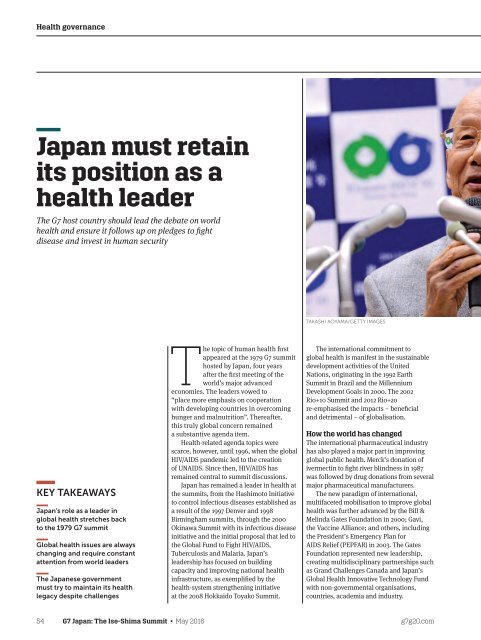G7_JAPAN
You also want an ePaper? Increase the reach of your titles
YUMPU automatically turns print PDFs into web optimized ePapers that Google loves.
Health governance<br />
Japan must retain<br />
its position as a<br />
health leader<br />
The <strong>G7</strong> host country should lead the debate on world<br />
health and ensure it follows up on pledges to fight<br />
disease and invest in human security<br />
TAKASHI AOYAMA/GETTY IMAGES<br />
KEY TAKEAWAYS<br />
Japan’s role as a leader in<br />
global health stretches back<br />
to the 1979 <strong>G7</strong> summit<br />
Global health issues are always<br />
changing and require constant<br />
attention from world leaders<br />
The Japanese government<br />
must try to maintain its health<br />
legacy despite challenges<br />
The topic of human health first<br />
appeared at the 1979 <strong>G7</strong> summit<br />
hosted by Japan, four years<br />
after the first meeting of the<br />
world’s major advanced<br />
economies. The leaders vowed to<br />
“place more emphasis on cooperation<br />
with developing countries in overcoming<br />
hunger and malnutrition”. Thereafter,<br />
this truly global concern remained<br />
a substantive agenda item.<br />
Health-related agenda topics were<br />
scarce, however, until 1996, when the global<br />
HIV/AIDS pandemic led to the creation<br />
of UNAIDS. Since then, HIV/AIDS has<br />
remained central to summit discussions.<br />
Japan has remained a leader in health at<br />
the summits, from the Hashimoto Initiative<br />
to control infectious diseases established as<br />
a result of the 1997 Denver and 1998<br />
Birmingham summits, through the 2000<br />
Okinawa Summit with its infectious disease<br />
initiative and the initial proposal that led to<br />
the Global Fund to Fight HIV/AIDS,<br />
Tuberculosis and Malaria. Japan’s<br />
leadership has focused on building<br />
capacity and improving national health<br />
infrastructure, as exemplified by the<br />
health-system strengthening initiative<br />
at the 2008 Hokkaido Toyako Summit.<br />
The international commitment to<br />
global health is manifest in the sustainable<br />
development activities of the United<br />
Nations, originating in the 1992 Earth<br />
Summit in Brazil and the Millennium<br />
Development Goals in 2000. The 2002<br />
Rio+10 Summit and 2012 Rio+20<br />
re-emphasised the impacts – beneficial<br />
and detrimental – of globalisation.<br />
How the world has changed<br />
The international pharmaceutical industry<br />
has also played a major part in improving<br />
global public health. Merck’s donation of<br />
ivermectin to fight river blindness in 1987<br />
was followed by drug donations from several<br />
major pharmaceutical manufacturers.<br />
The new paradigm of international,<br />
multifaceted mobilisation to improve global<br />
health was further advanced by the Bill &<br />
Melinda Gates Foundation in 2000; Gavi,<br />
the Vaccine Alliance; and others, including<br />
the President’s Emergency Plan for<br />
AIDS Relief (PEPFAR) in 2003. The Gates<br />
Foundation represented new leadership,<br />
creating multidisciplinary partnerships such<br />
as Grand Challenges Canada and Japan’s<br />
Global Health Innovative Technology Fund<br />
with non-governmental organisations,<br />
countries, academia and industry.<br />
54 <strong>G7</strong> Japan: The Ise-Shima Summit • May 2016 g7g20.com
















